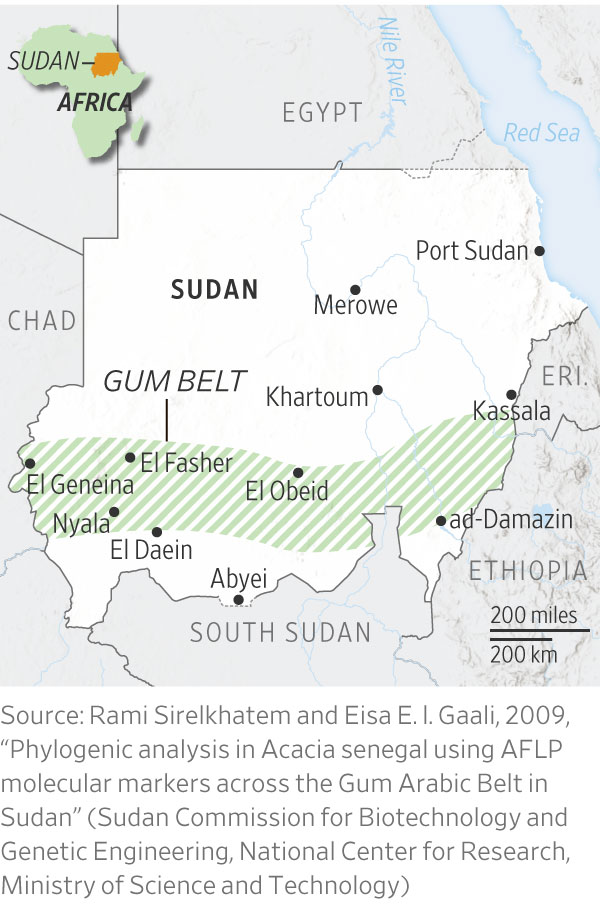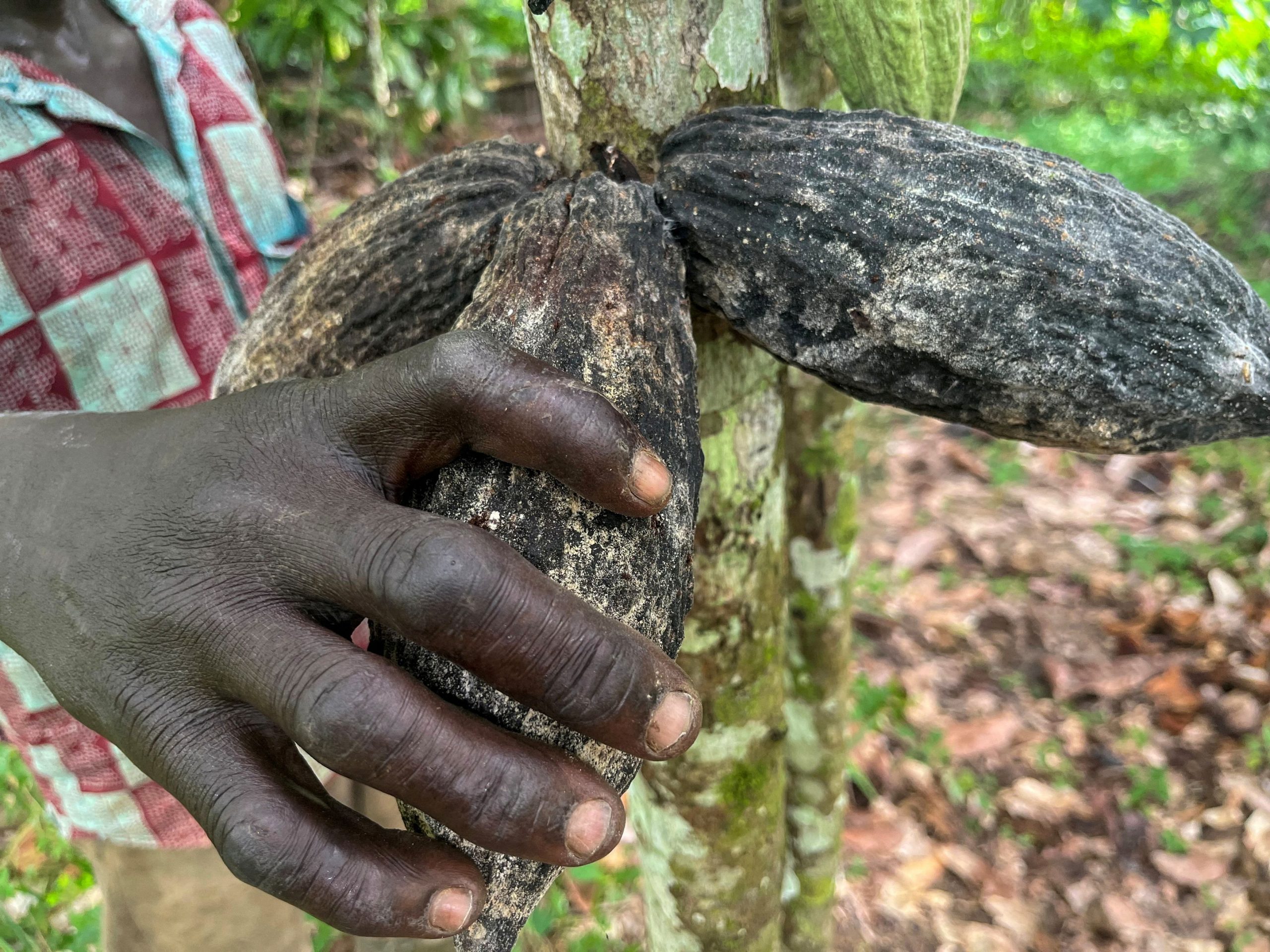Once a week, Muhamed Jaber drives down a bumpy road to the Sudanese city of El Obeid, the back of his truck heaving with bags full of amber-colored chunks of gum arabic, a little-known ingredient in chocolate, soda, chewing gum and other consumer goods.
Near the end of his 50-mile trip, Jaber says he pays around $330 to fighters from the Rapid Support Forces, a paramilitary group that the U.S. government has accused of ethnic cleansing and crimes against humanity in Sudan’s one-year-old civil war. The RSF has laid siege to El Obeid since June and controls three out of four major access roads to the city, which is one of Sudan’s main agricultural hubs and held by the country’s military.
“Moving in convoys is the only way to stay safe, but it’s very costly,” says Jaber. “Everyone has to pay.”
In addition to the payments at the main RSF checkpoints, Jaber says gum arabic traders also hand over between $60 and $100 to AK-47-toting RSF fighters, who accompany the convoys of traders in pickup trucks. Traders who refuse to pay risk losing their cargo and vehicles to militia, he says.
Around 80% of the world’s gum arabic is harvested from Sudan’s acacia trees, which grow in the desert belt that stretches from Sudan’s western border with Chad to its eastern border with Ethiopia, covering an area of roughly 200,000 square miles. Gum arabic is a tasteless and odorless dried sap used as a stabilizer, thickening agent or emulsifier for many foods, drinks, cosmetics and medicines.

The sap has become a key source of funding for both sides in the war, according to Sudanese traders. In addition to the RSF collecting money through its control of most major agricultural routes, the Sudanese military—which runs the country’s de facto government—levies taxes and other tariffs on the gum arabic trade.
The U.S. has accused both sides in the conflict of committing war crimes. In September, the State Department slapped sanctions on two senior RSF commanders for their alleged involvement in ethnic killings, sexual violence and the looting and burning of communities, among other abuses. Another two RSF commanders were sanctioned this month.
Around 8.5 million Sudanese have been forced from their homes since the start of the war in April 2023. Tom Perriello, the Biden administration’s special envoy for Sudan, this month warned that the war’s real death toll could be 10 to 15 times higher than the about 15,000 who are confirmed to have been killed.
“Proceeds from the gum arabic exports are directly financing this fighting,” says Rabie Abdelaty, a Sudanese academic who has researched the gum arabic industry.
Despite these concerns, few companies have taken steps to make sure they are avoiding Sudanese gum arabic, based on interviews with manufacturers, suppliers and end-users.
“You don’t want the customers to be out of gum,” said Osama Idris, general manager at Morouj Commodities UK, a raw-gum importer and processor based in Weston-super-Mare, in England. Idris said that none of his customers, which include confectionary, beverage and flavor companies, have expressed concerns about sourcing gum arabic from Sudan.
Nestlé, which adds gum arabic to chocolates and gummy candies, said that according to its suppliers, the small quantities it uses come primarily from Chad, Niger and Mali.
A spokesman for Kisses-maker Hershey said the company expects all of its suppliers to adhere to all laws in the countries in which they operate. A Ferrero spokeswoman said the chocolate maker has strict due diligence measures that all of its suppliers must comply with, including assessments and on-field audits.
French company Nexira, which says it has a 40% share of the global gum arabic market, paused its operations in Sudan for three months last year, but has since resumed and is receiving shipments of gum from the country.
“Despite uncertainties in transportation and potential incidents affecting the crop, we have decided to continue buying from harvesters,” a company spokeswoman said. “This is part of our commitment to the local communities with whom we have worked for several decades.”
She said some of Nexira’s contacts recently had reported “potential racketeering activity on Sudanese roads,” and said the company has asked its partners in the country to avoid routes where free movement can’t be guaranteed.
The U.S. Treasury Department, which is in charge of economic sanctions, declined to comment on whether it has considered gum arabic’s role in funding the war in Sudan. When the U.S. imposed sanctions against Sudan in the 1990s for its then-leader Omar al-Bashir’s alleged support for international terror groups, including al Qaeda, President Bill Clinton created a loophole for gum arabic, largely exempting shipments from the embargo imposed on bilateral trade.
Gum arabic is one of Sudan’s main agricultural exports. In 2022, Sudan exported gum arabic valued at around $183 million, making it one of the country’s top 10 exports overall, according to the latest available data.
Traders say they expect Sudan’s production to decline by around half during this season, which runs from October through about May, as many young men who normally harvest the sap have signed up to fight and others were too afraid to go out and tap the trees. Prices, meanwhile, have increased by around two-thirds to as much as $5,000 a metric ton, traders say.
Netherlands-based FOGA Gum, which used to import and process Sudanese gum arabic mainly to supply flavor companies in the U.S. and Europe, ceased all trading activities in Sudan in April 2023, shortly after the start of the war.
“Our business came to a complete halt,” said Martijn Bergkamp, a partner at FOGA Gum. “We work on a completely transparent food chain. Due to the war, it is not clear where gum comes from in Sudan. We don’t want to cooperate with either party.”
Now the company only supports tree planting by some nurseries in the western Darfur region, he said.
Traders say the bulk of Sudan’s gum arabic currently passes through El Obeid for onward export, mainly through Chad, Egypt and the Sudanese Red Sea city of Port Sudan.
“If there’s any big shortage of gum arabic on the world market, the repercussions could be quite serious,” said Rachid Amui, who monitors commodity trade at the U.N. Conference on Trade and Development, an agency that promotes the interests of developing countries in world trade.
Write to Alexandra Wexler at alexandra.wexler@wsj.com and Nicholas Bariyo at nicholas.bariyo@wsj.com



